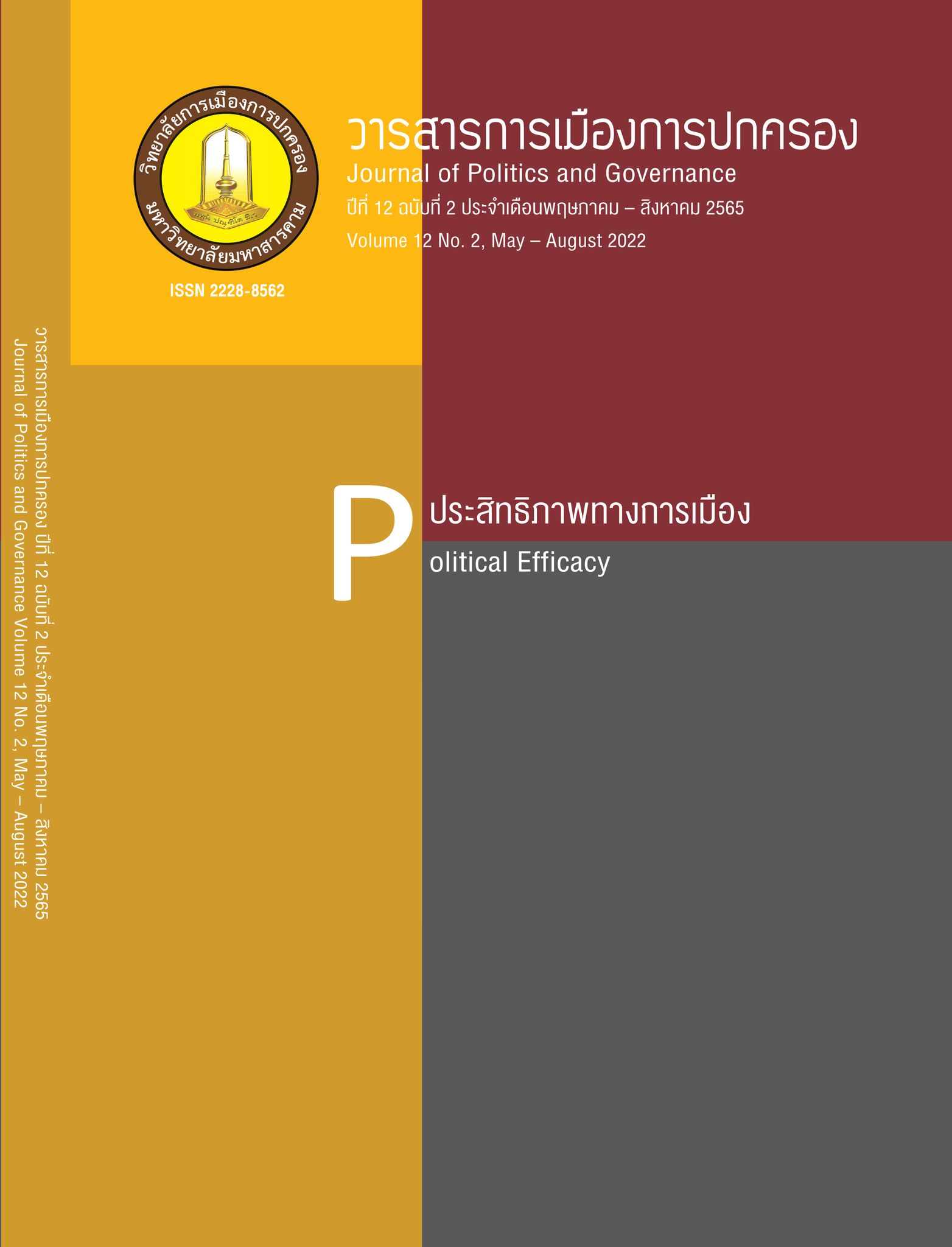Factors Influencing Public Participation in the Operation of Local Administration Organizations in Nakhon Pathom Province
Main Article Content
Abstract
This quantitative research studied 1) public participation in the operation of local administration organizations in Nakhon Pathom Province, 2) factors influencing public participation in the operation of local administration organizations in Nakhon Pathom Province, and 3) the creation of a prediction equation to forecast public participation in the operation of local administration organizations that varied from independent factors. The samples were 1,188 people with elective rights, and sample size was determined using the G*Power program. The research instrument was a five-rating scale questionnaire with overall reliability at 0.91. Statistics used included Mean, Standard Deviation, Pearson’s Product Moment Multiple Correlation Coefficient, and Multiple Linear Regression Analysis. Results showed that overall public participation in the operation of local administration was at the medium level. Eight factors statistically influenced overall public participation in the operation of local administration organizations in Nakhon Pathom Province at the 0.05 level. These were identified as Power Motivation (Beta = 0.61), Achievement Motivation (Beta = 0.54), Affiliation Motivation (Beta = 0.49), Community Leadership (Beta = 0.41), Public Benefit Needs (Beta = 0.28), Social Relation Needs (Beta = 0.21), Community Trouble Displeasure (Beta = 0.18) and Political Interest Factor (Beta = 0.14). The standardized prediction equation to forecast public participation was identified as = 0.49Z1 + 0.54Z2 + 0.61Z3 + 0.21Z4 + 0.28Z6 + 0.18Z9 + 0.41Z12 + 0.14Z13.
Article Details
References
คำนึง สิงห์เอี่ยม. (2560). รูปแบบการมีส่วนร่วมของประชาชนตามหลักธรรมาภิบาลในการบริหารจัดการองค์การปกครองส่วนท้องถิ่น จังหวัดภูเก็ต. (ดุษฎีนิพนธ์ปริญญารัฐประศาสนศาสตรดุษฎีบัณฑิต). มหาวิทยาลัยราชภัฎภูเก็ต.
ชุลีพร โพธิ์เหลือง. (2557). ผลสัมฤทธิ์การบริหารราชการด้วยหลักธรรมาภิบาล ตามภารกิจหลักขององค์การบริหารส่วนตำบลในเขตจังหวัดภาคกลาง. วารสารวิชาการมหาวิทยาลัยปทุมธานี, 6(2), 32-40
ถวิลวดี บุรีกุล. (2550). การมีส่วนร่วมของประชาชน: พฤติกรรมการมีส่วนร่วมในระดับต่าง ๆ ของประชาชน. กรุงเทพฯ: สถาบันพระปกเกล้า.
บวรศักดิ์ อุวรรณโณ. (2558). ประชาธิปไตยแบบมีส่วนร่วม (Participatory Democracy). กรุงเทพฯ: สถาบันพระปกเกล้า.
รังสิมันต์ บุณยปรรณานนท์. (2537). การมีส่วนร่วมทางการเมืองท้องถิ่น: ศึกษากรณีเปรียบเทียบระหว่างคณะกรรมการชุมชนและประชาชนในเขตเทศบาลตำบลทางเกวียน อำเภอแกลง จังหวัดระยอง. (รายงานผลการวิจัย). กรุงเทพฯ: คณะพัฒนาสังคม สถาบันบัณฑิตพัฒนาการบริหารศาสตร์.
วัชรินทร์ สุทธิศัย, และพงษ์ศักดิ์ ซิมมอนด์ส. (2561). การพัฒนาการมีส่วนร่วมทางการเมืองของประชาชนในพื้นที่จังหวัดมหาสารคาม. วารสารเซนต์จอห์น, 21(28), 246-264.
สมบัติ ธำรงธัญวงศ์. (2542). การพัฒนาทางการเมือง. กรุงเทพฯ: สถาบันบัณฑิตพัฒนาการบริหารศาสตร์.
สมศักดิ์ ศรีสันติสุข. (2558). รูปแบบการมีส่วนร่วมของภาคประชาชนในการติดตามตรวจสอบการดำเนินการขององค์กรปกครองส่วนท้องถิ่นด้านโครงสร้างพื้นฐาน: กรณีศึกษาเทศบาลตำบลห้วยโพธิ์ อำเภอเมือง จังหวัดกาฬสินธุ์. (รายงานการวิจัยฉบับสมบูรณ์). ขอนแก่น: สำนักวิจัยและพัฒนา มหาวิทยาลัยขอนแก่น.
สำนักงานคณะกรรมการกฤษฎีกา. (2556). พระราชบัญญัติสภาตำบล และองค์การบริหารส่วนตำบล พ.ศ.2537. ราชกิจจานุเบกษา, 110(26), 5.
สุภาพ วัยนิพิฐพงษ์. (2552). การมีส่วนร่วมของสมาชิกแจ้งข่าวอาชญากรรมในการป้องกันอาชญากรรมในเขตจังหวัดนครปฐม. (วิทยานิพนธ์ปริญญาสังคมศาสตรมหาบัณฑิต). มหาวิทยาลัยมหิดล.
อุดมโชค อาษาวิมลกิจ. (2558). การมีส่วนร่วมในกระบวนการประเมินผลการบริหารจัดการบ้านเมืองที่ดีขององค์กรปกครองส่วนท้องถิ่น. (รายงานผลการวิจัย). เชียงใหม่: คณะกรรมการสนับสนุนการวิจัย มหาวิทยาลัยเชียงใหม่.
Burkhart, R. E. (1997). Comparative Democracy & Income Distribution: Shape & Direction of the Causal Arrow. Journal of Politics, 59(1), 95-106.
Bureekul, T., Saengmahamat, R., Merieau, E. and Volpe, M. (2012). Citizenship in Thailand. Citizenship and the future of Thai Democracy. (KPI Congress Report). Bang: Sathaban Phra Pokklao. Thailand.
Cohen, J. M & Uphoff N. T. (1981). Participation’s Place in Rural Develop: Seeking Clarity through Specificty. Washington D.C.: World Development.
Cronbach, L.J. (1970). Essentials of Psycholoical Testing. New York: Harper & Row.
Faul, F., Erdfelder, E., Lang, A-G., & Buchner, A. (2012). G*Power 3: A Flexible Statistical Power Analysis Program for Social, Behavioral, & Biomedical. Behavior Research Methods, 39(1), 175-191.
Felton, S. Leeds. (1995). Transactional & Transformational Leadership. Dissertation Abstracts International, 67(7), 105-112.
Guilford, J. S. & Gray, D. E, (1970). Motivation & Modern Management. London: Harper & Row.
Maslow, A. (1970). Motivation & Personality. New York: Harper & Row.
McClelland, D.C. (1973). Testing for Competency rather than for Intelligence. American Phycologist. 28(2), 10-24
Nie, N. H. (1969). Political Participation. Massachusetts: Addison Wesley.
Zhao, J. S., Gibson, C., Lovrich, N. & Gaffney, M. (2012). Participation in Community Crime Prevention: Are Volunteers More or Less Fearful of Crime than other Citizens. Journal of Crime & Justice, 38(2), 41-61.


